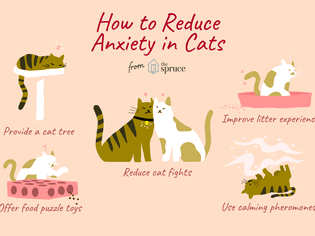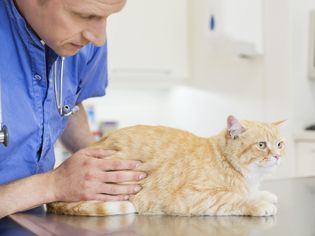How to Stop Your Cat From Tracking Litter and Poop
Cats are fastidiously clean animals. They constantly groom themselves, don't like to ...
Rosemary, Rosmarinus officinalis is a common herb that belongs to the Lamiaceae family of plants. This family is also sometimes called the mint, deadnettle, or sage family. Many of the members of this plant family, just like the rosemary plant, are aromatic herbs used widely in cooking. Other members of this plant family include basil, catnip, lavender, marjoram, mint, oregano, sage, and thyme, just to name several. Rosemary is a common addition to home herb gardens. This may lead you to wonder if it’s safe for your cat to eat.
Rest assured, according to the ASPCA animal poison control, rosemary is non-toxic to cats, as well as to dogs and to horses. There are members of the Lamiaceae family that the ASPCA lists as toxic to cats. These include, surprisingly, catnip, lavender, marjoram, mint, and oregano. The symptoms of toxicity of these all include gastrointestinal upset, such as vomiting, diarrhea, and a decreased appetite. Non-toxic members of the Lamiaceae plant family include basil, candle plant, prostrate coleus, sage, both summer and winter savory, Swedish ivy, and thyme.
While rosemary is listed as non-toxic, you shouldn’t let your cat munch on it uninhibited. Rosemary contains a variety of volatile oils including monoterpene, hydrocarbons, camphene, limonene, camphor, borneal, cineole, linalool, and verbinol. These oils, if consumed in a large enough quantity, can cause vomiting, diarrhea, and other GI signs. That being said, most cats won’t eat enough rosemary to cause any discomfort. Rather, they may give a curious nibble or two.
If your cat does decide to eat a large amount of rosemary, even though it’s technically not considered to be toxic you should monitor your cat closely for any GI signs. These can be things as blatant as vomiting, diarrhea, or inappetence. More subtle signs of GI discomfort can include the non-specific symptom of lethargy or just laying around more and not acting like themselves. If you do see any of these symptoms, seek veterinary care.
In animal studies, rosemary has been shown to help conventional therapies for cardiac conditions such as hypertrophy or decreased function. However, these have been limited rat studies, so we don't seem to have any reputable evidence to definitely say that rosemary has health benefits for cats.
Essential oils are toxic to cats and should not be used topically or aromatically around them. Rosemary essential oil should never be applied to your cat as they can easily groom the oil off of them and ingest it. Not only can ingesting rosemary essential oil cause vomiting and diarrhea, but the ultra-concentrated oils being ingested can cause depression of the central nervous system. This can cause a drop in heart and respiratory rate and can even cause seizures.
Essential oil diffusers work by aerosolizing the concentrated oils but were your cat to inhale these aerosolized oils, this can cause respiratory tract irritation as well as vomiting and diarrhea. Signs of respiratory tract irritation can include a watery nose and eyes, drooling, and difficulty breathing.
Cats are fastidiously clean animals. They constantly groom themselves, don't like to ...

Different cats display different types of behaviors. Some cats are very cuddly and affect...

While it's normal for cats to chew on everything—even things that aren't meant ...

The typical anxious cat hides, urinates inappropriately, increases scratching, and/o...

It’s no secret that cats love fish—the fishier, the better. Tuna is a quintessential ...

If your cat died, and you can't stop crying, feeling lonely, or otherwise experiencin...

When facing the imminent death of a terminally ill beloved cat, or when a feline companio...

The only way to know for sure whether your cat has a fever is to take its temperature. Th...

Feline immunodeficiency virus is also known as FIV or feline AIDS. The disease is caused ...
Comments on "Is Rosemary Safe For Cats?" :